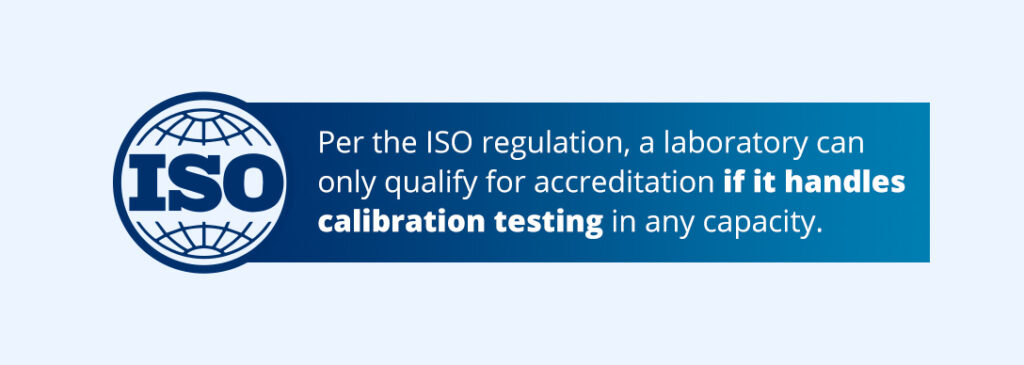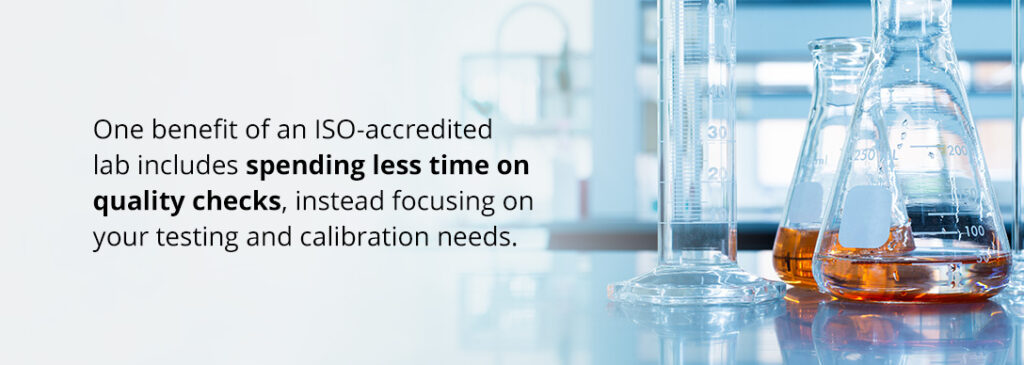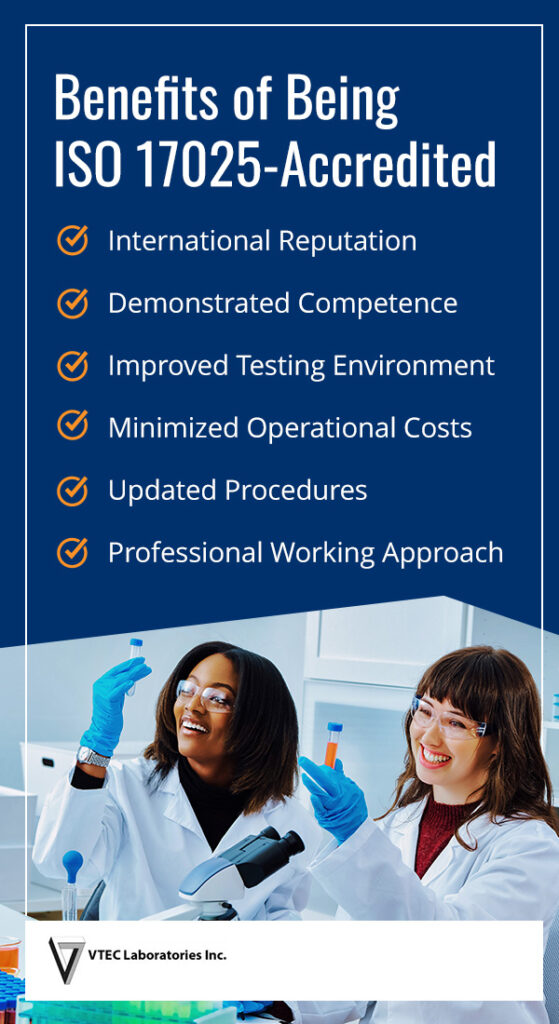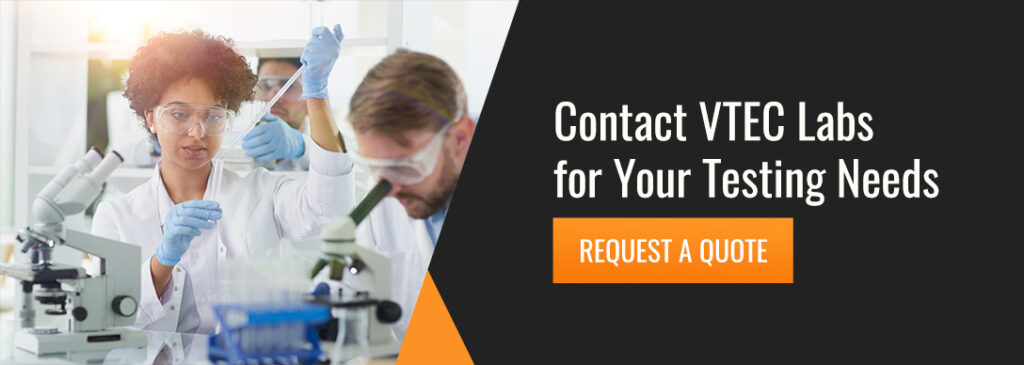The Importance of ISO 17025 Lab Accreditation
 Many industries use testing to get unbiased assessments of their products. Testing can cover anything from quality and conformance to safety and calibration. While companies often turn to labs to accomplish this, laboratories that offer testing as a service must meet the criteria for performing these experiments. Many laboratories prove their testing qualification through accreditation. Specifically, calibration laboratories need certification for the ISO 17025 standard.
Many industries use testing to get unbiased assessments of their products. Testing can cover anything from quality and conformance to safety and calibration. While companies often turn to labs to accomplish this, laboratories that offer testing as a service must meet the criteria for performing these experiments. Many laboratories prove their testing qualification through accreditation. Specifically, calibration laboratories need certification for the ISO 17025 standard.
ISO/IEC 17025 is accredited for laboratories that perform product testing, sampling, and calibration. This recognition is highly desirable for calibration labs worldwide, as it demonstrates that the lab meets global standards for operational competence and validity. But what is this standard, and what does accreditation mean for labs and their customers?
Here, we will discuss the importance and benefits of ISO 17025 lab accreditation so you can understand what ISO 17025 means for your business and how it can improve your operations.
What Is ISO 17025 Compliance and the Requirements?
ISO 17025 is a standard that defines quality management for calibration services. Calibration laboratories worldwide recognize and follow this standard, regardless of their structure. Independently owned labs and certification organizations adhere to these guidelines, and so do government bodies, universities and research centers. This standard sets an international baseline for conformity. Earning accreditation for this standard signals that a calibration lab meets global industry regulations for quality and accuracy.
 Calibration laboratories must prove and maintain their compliance to get accredited to ISO 17025. They earn initial accreditation when a third party evaluates and certifies them. After that, the laboratory must undergo regular audits to verify continuing adherence to the regulation.
Calibration laboratories must prove and maintain their compliance to get accredited to ISO 17025. They earn initial accreditation when a third party evaluates and certifies them. After that, the laboratory must undergo regular audits to verify continuing adherence to the regulation.
In compliance audits, the auditor will assess and test multiple areas of a company’s procedure and structure. These tests and audits primarily focus on five areas, outlined by the standard as follows.
1. General Requirements
Section 4 of the standard covers general laboratory requirements, primarily focused on impartiality and confidentiality. Impartiality means the laboratory will not allow outside commercial or financial influences to compromise or alter results. They must also ensure impartiality is present in all activities, responsibilities, management, risk identification and risk mitigation.
On the other hand, confidentiality means the laboratory will keep its results private, which includes maintaining privacy associated with the release of customer data, the lab’s responsibility, consumer information from other sources and personnel obligations. These protocols are essential for maintaining customer trust and confidence. They are also critical requirements for maintaining a laboratory’s reputation.
2. Structural Requirements

Section 5 of the standard defines a laboratory’s essential organizational components. This structure includes the lab’s overall hierarchy and functionality. Per the ISO regulation, a laboratory can only qualify for accreditation if it handles calibration testing in any capacity. As for structural requirements, the standard outlines each role’s responsibilities. For example, managers must oversee everyday activities and maintain their obligations to customers and regulatory authorities. The ISO guideline also sets basic competency requirements and duties for laboratory personnel.
3. Resource Requirements
Section 6 of the standard addresses the resources laboratories need to conduct testing effectively. These resources include six clauses that specify the basic requirements for specific resource areas:
- Facilities and environmental conditions
- Equipment
- Staff
- Metrological traceability
- Products and services from external sources
- Other general components
4. Process Requirements
Section 7 of the standard includes 11 core processes for maximum efficiency. The first few focus on assessing contracts and techniques. Most of the following procedures outline testing best practices, such as sampling methods, recordkeeping, monitoring and verification. The final clauses focus on handling problems like nonconforming work and customer complaints. Here’s an accurate look at the process requirements you should meet:
- Reviewing tenders, contracts and requests
- Selecting, verifying and validating methods
- Sampling and handling calibration or test items
- Evaluating technical records and measurement uncertainty
- Establishing result validity
- Meeting standard result reporting requirements
- Handling complaints
- Nonconforming work
- Controlling information and data management
5. Management System Requirements
Section 8 of the standard lays out expectations for laboratory management systems. This section emphasizes two options.
- Option A: This option applies to laboratories using an independent quality management system from a separate management system.
- Option B: Laboratories that are part of a larger organization and using an umbrella QMS fall in the option B category. This option also adheres to laboratories that established their owned management system aligned with ISO 9001:2015.
Depending on the option that applies to a laboratory, they will need to meet management system requirements related to the following:
- Control of management system documents
- Appropriate risk and opportunity actions
- Management system documentation
- Corrective actions
- Improvement procedures
- Control of records
- Management reviews
- Internal audits
Auditors review all these factors within the “scope” set by the laboratory, which is the section looking to gain ISO accreditation. Auditors assigned to the laboratory will review the provided documentation and procedures, then make an on-site visit to test the facility for conformance. Depending on the scope outlined by the laboratory, this may involve various process-specific tests and audits. After these procedures, facilities that pass the audit will receive their certification or ISO renewal.
No standard is stagnant, and ISO 17025 is no exception. Labs that wish to maintain accreditation must keep up with updates in this ISO guideline. For example, ISO 17025 underwent revisions in 2005 and again in 2017 in response to changes in technology and industry vocabulary.
The updates included new structural and resource requirements to ensure labs were up to speed with technological advancements. Sections covering process requirements also include new industry best practices, such as risk-based thinking.
Importance of Being an ISO 17025-Accredited Lab
Since ISO 17925 accreditation proves that a laboratory follows high-performance standards and is competent and safe, an ISP 17025 certificate is one of the most valuable accreditations a laboratory can earn. While encouraging the creation of a QMS that meets your laboratory’s needs, it also influences high quality, efficiency and accuracy. Here are a few reasons ISO 17025 accreditation is critical to your lab’s success.
Validity of Final Results
ISO 17025-accredited labs maintain thorough processes and quality control measures to ensure result accuracy. Accredited laboratories will provide these results in detailed final reports that summarize their findings and any measurement uncertainties. Quality outcomes mean customers can avoid expensive retesting services and get the information they need more quickly.
Minimized Risk
ISO accreditation establishes a baseline of technical competency that represents industry standards. Through their accreditation, testing laboratories show they are competent and qualified for the task. Additionally, the ISO 17025 regulation also requires labs to implement measures like risk-based thinking and continuous process improvement. By selecting a lab with ISO accreditation, customers partner with a technically competent lab that considers risk mitigation. That quality is essential for customers who want to do their due diligence in minimizing risk.
Competent Testing Staff
ISO 17025 sets stringent standards for testing staff, such as their training requirements and core competencies. ISO-accredited labs must meet or exceed these expectations, meaning you don’t need to worry about untrained staff interfering with your results and resulting in a need for retesting services.
Quality Lab Testing Environment
ISO standards mandate high expectations for laboratory resources. These include guidelines for instrumentation, equipment and testing environments, staff and third-party resources. Laboratories must meet or exceed these expectations to gain ISO accreditation. For customers, this means all testing takes place in an appropriate environment with quality equipment, significantly decreasing the chance of errors.
Reduced Need for Assessment

ISO 17025 is strict, requiring laboratories to maintain quality testing environments, employ trained personnel and follow rigorous quality management protocols. While customers may feel the need to perform independent laboratory assessments to verify their quality, ISO is a trusted alternative. One benefit of an ISO-accredited lab includes spending less time on quality checks, instead focusing on your testing and calibration needs.
Investment in Customer Feedback
ISO 17025 places a high value on customer feedback, so laboratories following this standard take the time to investigate problems, implement solutions and update customers regarding any changes. All these factors result in improved customer confidence and satisfaction with ISO-accredited labs.
Enhanced Industry Reputation
If you’re looking to increase your credibility among shareholders and consumers, ISO 17025 lab accreditations help you achieve that goal. Customers can trust that you will deliver quality results and calibration, and people within the industry will recognize your organization’s reliable measurement and testing services.
These qualities allow you to reap the benefits of having an established and secure quality system, including an improved industry reputation and increased brand recognition and awareness. While attracting attention for all the right reasons, you may also gain more investors and customers.
Improved Compliance
Consumers can sometimes be highly specific about which laboratory they choose. Understandably, people want to work with a lab that follows their industry’s legislation and requirements to negate legal issues and have quality equipment that will work well in the long run.
Having an ISO 17025 accreditation shows your potential consumers that you follow the relevant regulations. Increased compliance will also help your organization adhere to regulations, saving you from fines.
More Efficient Processes
While it may take some time to implement ISO 17025 standards, you’ll gain various productivity and efficiency benefits once all members of the organization are on board. Compliance standards for ISO 17025 require frequent evaluation of equipment, methods and staff procedures to help the laboratory find accurate results faster over time.
These standards also define each staff member’s role and tasks and encourage employees to take accountability for their actions and follow the correct procedures. Team members can be more productive when following compliance standards, decreasing the need for retests when they carry out processes correctly the first time.
Better Performance
Another essential aspect of ISO 17025 accreditation is that it sets higher standards for employees, inspiring them to raise their performance, reduce mistakes and improve product quality. To further encourage these practices, laboratories can usually expect inspectors to regularly check their compliance with ISO 17025 standards, allowing them to maintain and improve their performance as time goes on.
More Business Opportunities
One of the most significant reasons to attain an ISO 17025 certificate is its ability to influence more business opportunities. While representing your compliance with regulations and building your industry reputation, it simultaneously encourages consumers to trust your laboratory more. If you have many competitors with ISO accreditations, earning yours will attract more consumers.
Your ISO 17025 accreditation proves that you will approach critical processes reliably and correctly. By doing so, you improve customer service, so people will return to your organization for help again in the future.
Ultimately, it’s impossible to understate the importance of ISO-accredited labs for clients. These facilities provide quality results with minimal long-term risks and costs.
Is ISO 17025 Accreditation Required for Testing Labs?
While ISO 17025 accreditation is not a requirement for testing labs, it can give laboratories a significant advantage. ISO/IEC accreditation is an internationally recognized standard that helps organizations build trust with consumers and appear reliable. Inaccuracy can have severe consequences, so receiving lab accreditation is vital.
As a 17025-accredited laboratory, you can facilitate better cooperation with and acceptance of results from other bodies because they know your results will be valid. Certification also allows organizations from other countries to accept your results without doing further tests.
Another advantage is that ISO 17025 accreditation enables better data sharing. When various laboratories around the world carry out similar tests to the same standards, it creates a larger pool of data for numerous industries to work with. As AI tools like predictive models grab this data to identify common risks and additional information, ISO/IEC accreditations help ensure more consistent data spreads globally.
Benefits of Being ISO 17025-Accredited
 Labs must go through a rigorous evaluation process to earn and maintain their ISO 17925 accreditation. While this process is costly, labs gain numerous long-term benefits from ISO accreditation. ISO 17025 benefits make the process incredibly valuable for labs that decide to seek accreditation.
Labs must go through a rigorous evaluation process to earn and maintain their ISO 17925 accreditation. While this process is costly, labs gain numerous long-term benefits from ISO accreditation. ISO 17025 benefits make the process incredibly valuable for labs that decide to seek accreditation.
International Reputation

As an international standard, accreditation with ISO 17025 holds laboratories to a global expectation. ISO 17025-accredited labs have better national and international reputations, allowing them to do business with customers worldwide. Simultaneously, these labs can enjoy greater customer confidence and a reduced need for independent assessments from new clients.
Demonstrated Competence
Clients need to trust that a laboratory will meet their needs and expectations before doing business with them. With ISO 17025 accreditation, clients can trust that an independent third party has assessed the lab’s equipment and staff. Therefore, they can save time and money and ensure efficient, accurate results.
Improved Testing Environment
The ISO 17025 regulation set standards for testing environments, including instrumentation, equipment and procedural expectations. These quality expectations, along with process improvements outlined by the regulation, result in an improved testing environment that generates excellent results.
Minimized Operational Costs
ISO 17025 outlines strict guidelines for monitoring results and implementing process improvements. By updating procedures to maximize efficiency and minimize retesting needs, labs can effectively reduce their operational costs.
Updated Procedures
ISO 17025 receives periodic updates to keep up with technological improvements and industry best practices. In seeking accreditation, laboratories must follow along with these enhancements, meaning the sector as a whole conforms to a higher level. Simultaneously, the standard encourages continuous process improvement, which pushes laboratories to improve their procedures as needed. Both aspects require laboratories to track testing trends and regularly implement new industry best practices.
Professional Working Approach
ISO 17025 supports a hierarchical order to laboratory structures, delineating employee responsibilities within a clear framework. Additionally, the standard encourages developing clear procedures, policies and rules that create a more clean-cut working environment. Doing so minimizes ambiguity for the sake of efficiency, risk mitigation and error minimization. This aspect of accreditation improves lab results, keeps staff accountable and boosts employee morale.
To top it off, ISO 17025-accredited laboratories tend to garner greater customer confidence and satisfaction than other labs. With ISO 17025 procedures and process improvements, testing and calibration laboratories can deliver better results for their customers more consistently, allowing them to stay ahead of the competition.
Is VTEC Accredited?
 If you’re looking for quality testing that minimizes long-term risks and costs, an ISO accredited lab is the best choice. VTEC Labs maintains accreditation with various standards, including ISO 17025 for all your testing needs. Here is a more detailed look at the ISO standards and accreditations VTEC uses to ensure our clients get the highest-quality results.
If you’re looking for quality testing that minimizes long-term risks and costs, an ISO accredited lab is the best choice. VTEC Labs maintains accreditation with various standards, including ISO 17025 for all your testing needs. Here is a more detailed look at the ISO standards and accreditations VTEC uses to ensure our clients get the highest-quality results.
ISO 17025 Accreditation
VTEC’s facility is ISO 17025-accredited to ensure all our product testing and certification is accurate and maintains compliance. We perform calibration, sampling and product testing while meeting international standards for operational competence and validity. To deliver excellent results, we establish our process and objectives for each project meet our clients’ requirements, carry out the appropriate processes and follow the necessary ISO 17025 policies and standards.
ISO 17020 Accreditation
ISO 17020 accreditation is specifically for organizations that perform inspections to test a product’s conformity to a standard or design. The purpose of ANAB accreditation to ISO 17020 is to ensure companies performing inspections have the qualifications and equipment to do these checks. It also ensures these facilities implement internationally recognized industry best practices. Most importantly, accreditation requires the inspection company to maintain integrity, manage conflicts of interest and deliver valid results unaffected by bias or external pressures.
ISO 17065 Accreditation
ISO 17065 accreditation is for organizations that certify the quality of a product, process or service. Organizations that maintain this accreditation assess products and services against international standards and determine whether they qualify for certifications and licenses used for marketing. Accreditation to the ISO 17065 standard requires the laboratory performing the testing to maintain appropriate staff and testing environments, implement accurate procedures and make unbiased decisions using industry best practices.
In addition to our ISO accreditations, VTEC Labs also holds accreditations with the U.S. Navy, the American Association for Laboratory Accreditation, Naval Sea Systems Command, Naval Surface Warfare Center and several city housing departments. We also perform regular testing per ASTM, UL, European Standard, Institute of Electrical and Electronics Engineers and National Fire Protection Association standards, allowing us to meet requirements in all countries.
With our accreditations, VTEC Labs stands ready to perform a broad range of testing services for calibration, inspection and quality certification.
Contact VTEC Labs for Your Testing Needs
If you’re looking for testing and calibration services held to the highest quality standards, VTEC Laboratories is here to help.
VTEC Laboratories has a reputation as a leading international commercial and testing service provider. Since 1982, we have dedicated ourselves to providing quality services and maintaining compliance with international standards. Our multifunctional company offers a range of lab services, from testing and inspection to listing and labeling. We even conduct safety tests for building departments for facilities across the United States. With a typical testing turnaround of two weeks and various rush options, we ensure top-tier testing quality and speed.
To learn more about why so many companies and government agencies choose VTEC for quality testing services, contact VTEC Labs today or request a quote for customized testing from our professional team!

